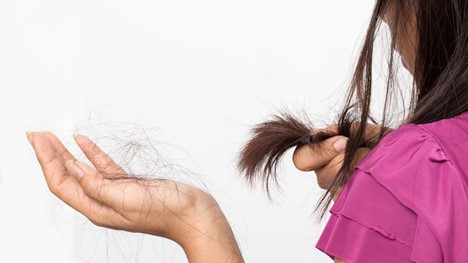Is your carpet covered with hair? Although it’s normal for approximately eighty strands to fall out daily, any more shedding is considered abnormal. Alopecia is more prevalent than most women think, triggered by a variety of physical and mental issues. Hormonal imbalance, stress, hyperthyroidism, hypothyroidism, iron deficiency, and pregnancy are only a few of the causes.
 |
| A Guide to Hair Re-growth for Women |
Whether genetic or
reactive, alopecia can be treated with various natural remedies or hair
products. Nowadays, women can purchase different shampoos and conditioners,
such as Keranique hair products, designed for the treatment of alopecia.
The guide below will
teach you about the causes of alopecia and the best treatments for this
condition.
Causes
Hair loss in women
can be either genetic or reactive, depending on the cause. The former occurs in
females with a genetic predisposition to follicle sensitivity to androgens,
whereas the latter is caused by a trigger such as stress or a health problem.
Hormonal imbalance is
known as one of the leading triggers of alopecia, affecting the beauty and
well-being of numerous women around the globe. Not all hormones are considered
detrimental to hair growth; only the male hormones. Estrogen and progesterone,
the female hormones, assist the growth cycle, whereas androgens aren’t as
hair-friendly. Even though the female body produces androgens, these are
supposed to be minimal in order not to cause a disorder like Polycystic Ovarian
Syndrome.
Furthermore, stress
is an enemy of hair growth, being one of the most common causes of alopecia.
Stress is powerful enough to trigger an increase of androgen levels, hence
resulting in this condition. It not only induces hair loss but also causes
dandruff, digestive problems, and eating disorders. All of these factors are
considered detrimental to hair growth.
Moreover,
hyperthyroidism and hypothyroidism are also believed to trigger alopecia. The
former happens when the thyroid gland is underactive, while the latter occurs
when the gland is overactive and produces too many hormones. The thyroid gland
is in charge of regulating metabolism and ensuring all tissues are supplied
with oxygen. Any type of thyroid imbalance is believed to increase follicle
sensitivity. Read more about the signs, symptoms, and causes of
hyperthyroidism.
Iron and Vitamin B12 deficiency are other frequent triggers of alopecia. Iron plays a major role in the production of the protein in charge of hair growth, while vitamin B12 is vital in oxygen supply. Upon noticing any sign of such deficiency, women are advised to perform a blood test to determine the exact iron levels. It’s essential to speak to your doctor if you have an iron deficiency, as it is possible to overdose on iron with DIY treatments. You can avoid next-day iron infusion side effects and iron overload with professional medical care.
In addition, age is
considered an important factor affecting the likelihood of alopecia in women.
In the course of menopause, females not only experience body changes but
changes in hair growth as well. In the event of sudden weight loss, women are
also prone to experiencing this condition, at least six weeks following the
loss in kilograms.
Pregnancy is another life period after which women are likely to cope with hair loss. The drop in estrogen levels triggers temporary alopecia, which gradually gets back to normal following labor. In order to induce re-growth, females are advised to use conditioners and shampoos for better volume. Learn more with Majka on how to choose the right shampoo for postpartum hair loss.
Re-growth tips
Women aren’t supposed
to feel disheartened when dealing with alopecia, as there is an abundance of
natural remedies and hair products designed for re-growth. For instance,
massaging the scalp daily for at least four minutes is an effective method of
stimulating hair thickness and growth. Visit the following link,
https://www.mindbodygreen.com/articles/scalp-massage, to learn how to become
proficient at scalp massage.
Additionally, aloe
vera is a prominent natural remedy in the treatment of alopecia. This plant
uses its calming properties to soothe the scalp, minimize dandruff production,
and remove the excess oil that blocks the follicles. Women can either use pure
aloe vera directly on the scalp or a shampoo containing this ingredient.
Coconut oil is believed to stimulate growth and has a reducing effect on protein loss. Females can apply the oil prior to washing their hair or afterward by massaging the right amount into the scalp. The nutrient and protein value of fish oil is believed to enhance density and growth as long as you take an omega supplement on a daily basis.
Another popular
ingredient in the fight with alopecia is the lemon. Make sure you squeeze a
fresh lemon and use the juice to apply it to the scalp. Instead of applying
lemon juice only, you can mix it with essential oil and make a mask.
If you aren’t fond of using natural remedies, you can always purchase hair growth products for black women designed for getting rid of alopecia. There is a variety of shampoos, conditioners, and serums made with special ingredients to stimulate growth, hydration, and restoration. It’s paramount to have a detailed look at the list of ingredients in order to ensure these won’t do harm to your scalp. If possible, read some reviews by customers to learn whether the product is really worth the try.
Besides natural
remedies and products, women are suggested to make some nutritional changes,
particularly when deficient in iron. Females are supposed to consume eighteen
milligrams per day through natural sources like fish, nuts, beans, and green
vegetables. Make sure you enrich your diet with zinc by consuming a minimum of
eight milligrams a day. Poultry, dairy products, and red meat are considered
rich sources of zinc.
Besides zinc,
selenium is another beneficial ingredient in reducing alopecia. In order not to
cause selenium toxicity, don’t consume more than fifty-five micrograms daily.
Selenium is best consumed through eggs, poultry, meat, and dairy products.
Don’t let alopecia dishearten you from trying different treatments.
There is a plethora
of remedies and products waiting for you to test them.
The ultimate choice
is yours!



No comments:
Post a Comment
Please Leave a Comment to show some Love ~ Thanks